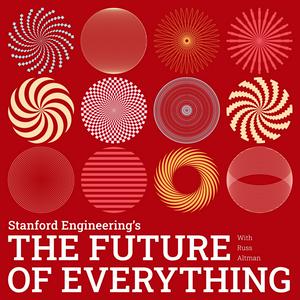Chuck Eesley, a professor of management science and engineering, studies entrepreneurship across diverse contexts – from refugee entrepreneurs in Uganda to semiconductor startups navigating U.S.-China economic policy. His research on recent export controls revealed a counterintuitive outcome: Rather than solely strengthening U.S. semiconductor innovation, these policies accelerated Chinese investment in its own domestic chip industry, boosting startups there as much as – or more than – here. This finding underscores how global technology markets are deeply interconnected: Barriers can produce unintended consequences that accelerate innovation abroad rather than protecting it at home. Open technology trade and investment create larger markets for American innovations, strengthen collaborative partnerships, and demonstrate that interconnected markets drive progress for all participants. “Entrepreneurial talent exists everywhere,” Eesley tells host Russ Altman on this episode of Stanford Engineering’s The Future of Everything podcast.
Have a question for Russ? Send it our way in writing or via voice memo, and it might be featured on an upcoming episode. Please introduce yourself, let us know where you're listening from, and share your question. You can send questions to
[email protected].
Episode Reference Links:
Stanford Profile: Charles (Chuck) Eesley
Connect With Us:
Episode Transcripts >>> The Future of Everything Website
Connect with Russ >>> Threads / Bluesky / Mastodon
Connect with School of Engineering >>> Twitter/X / Instagram / LinkedIn / Facebook
Chapters:
(00:00:00) Introduction
Russ Altman introduces guest Chuck Eesley, a professor of management and engineering at Stanford University.
(00:03:04) Why Study Entrepreneurship?
Chuck explains why entrepreneurs are drivers of modern economic growth.
(00:03:30) Defining Entrepreneurship
Broad vs. narrow entrepreneurship, from startups to large organizations.
(00:04:33) Institutional Environments
How policies and culture both shape entrepreneurial outcomes.
(00:05:44) Studying Institutions & Entrepreneurship
Measuring institutional shifts to isolate entrepreneurial outcomes.
(00:08:12) Founder & Talent Incentives
What’s needed for high-opportunity-cost talent to start companies.
(00:09:36) AI Entrepreneurship
The impact of data and compute concentration on startup dynamism.
(00:11:28) Designing AI Regulation
Historical examples of regulation enabling startups to compete fairly.
(00:13:43) Incentives Inside Big Tech
Why some incumbents support startups while others tilt the playing field.
(00:15:28) Ad Placement & Misinformation Funding
How digital advertising can unintentionally fund low-credibility content.
(00:21:24) Misinformation Market Solution
The disclosure mechanisms that may reduce misinformation incentives.
(00:25:23) Semiconductors & Entrepreneurship
The importance of startups in a field often dominated by large incumbents.
(00:29:30) Unintended Policy Effects
How U.S. policy may be accelerating Chinese semiconductor investments.
(00:31:09) Competing Industrial Policies
Why evaluation and iteration are essential for effective policy design.
(00:32:31) Global Entrepreneurship
Emerging entrepreneurship models spreading across regions and contexts.
(00:36:26) The Universal Entrepreneurial Mindset
Shared entrepreneurial traits across cultures, contexts, and countries.
(00:37:14) Future In a Minute
Rapid-fire Q&A: democratizing entrepreneurship, context, and equitable inclusivity.
(00:41:02) Conclusion
Connect With Us:
Episode Transcripts >>> The Future of Everything Website
Connect with Russ >>> Threads / Bluesky / Mastodon
Connect with School of Engineering >>>Twitter/X / Instagram / LinkedIn / Facebook
Hosted by Simplecast, an AdsWizz company. See pcm.adswizz.com for information about our collection and use of personal data for advertising.


